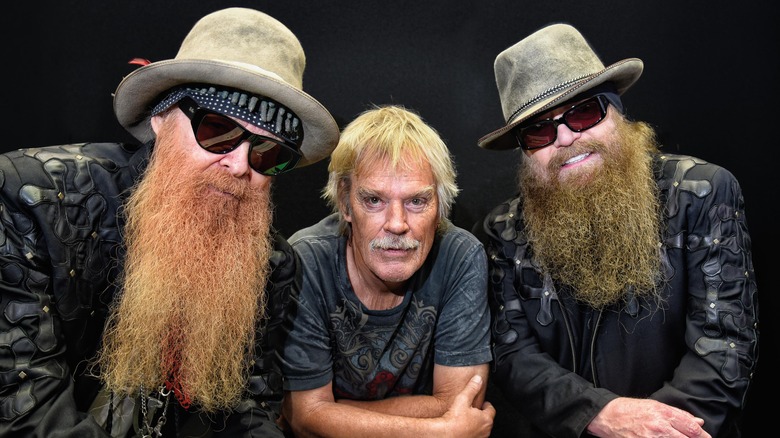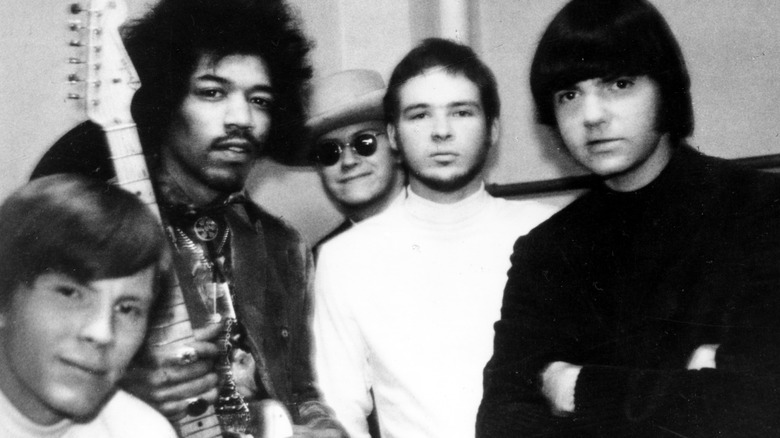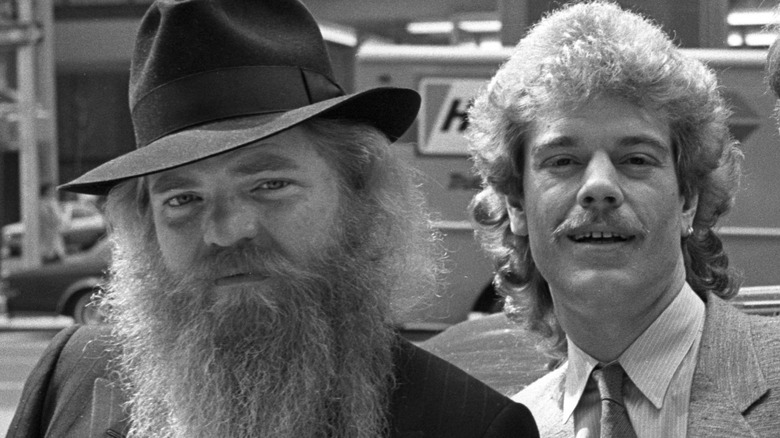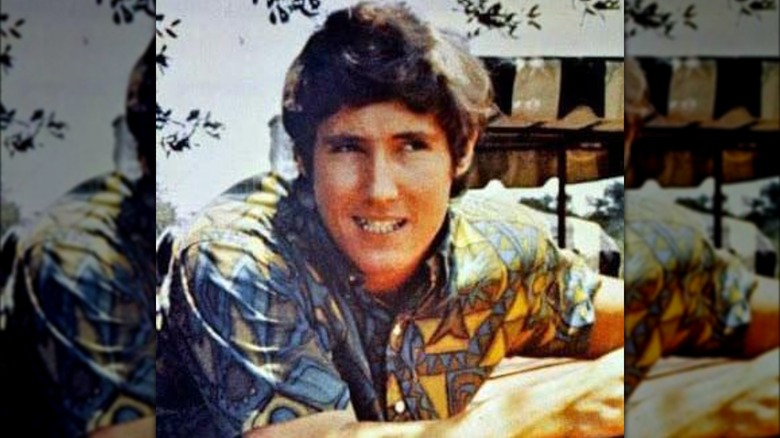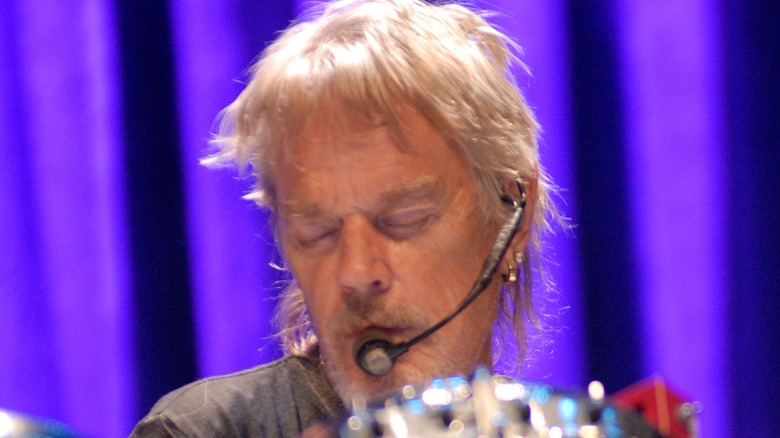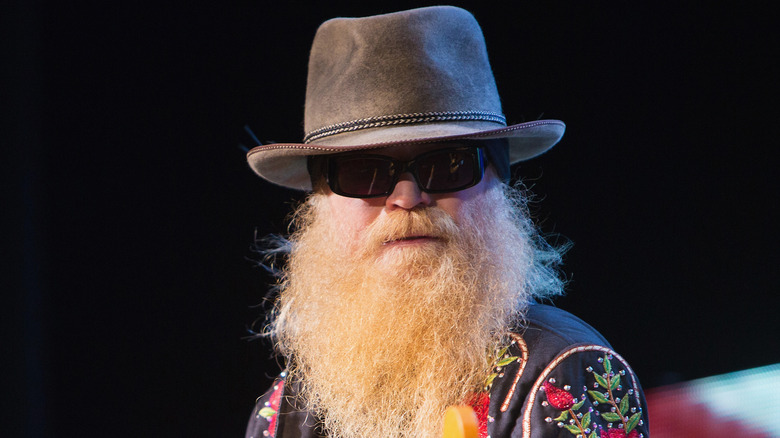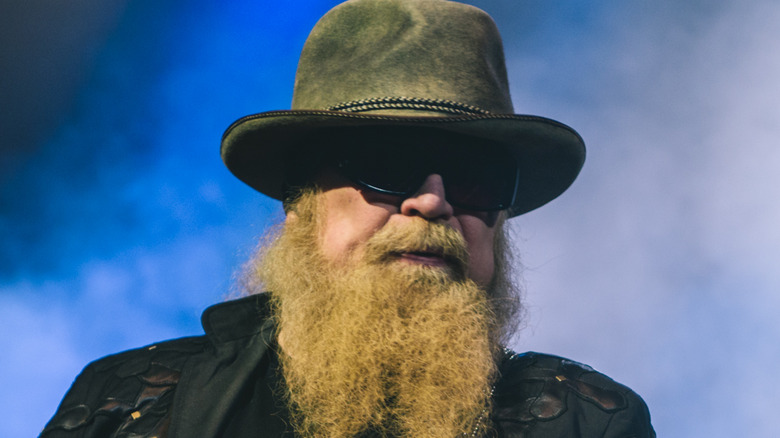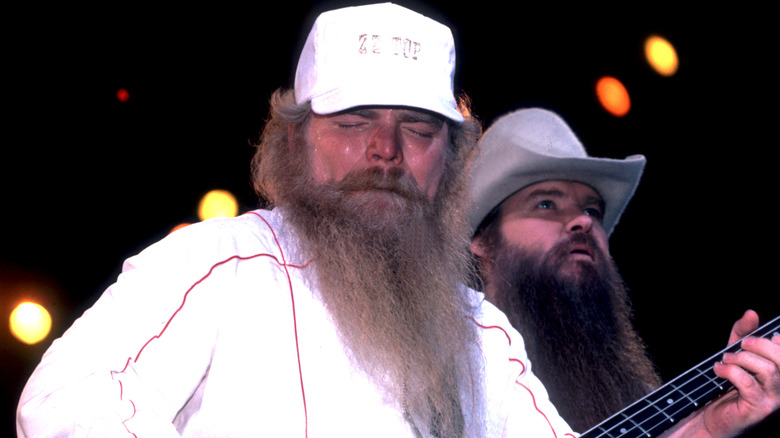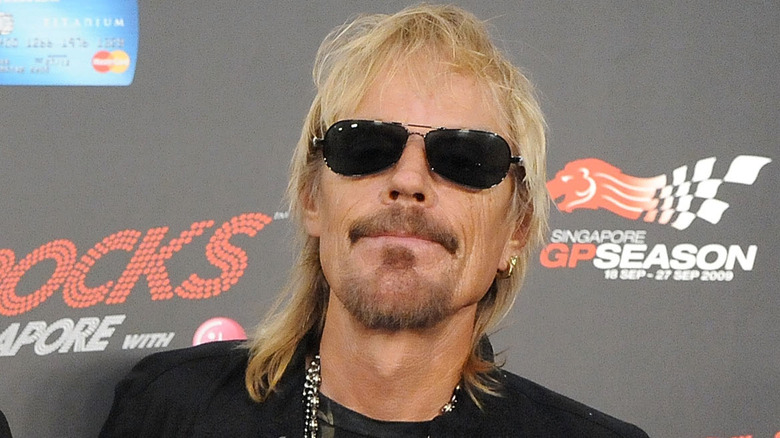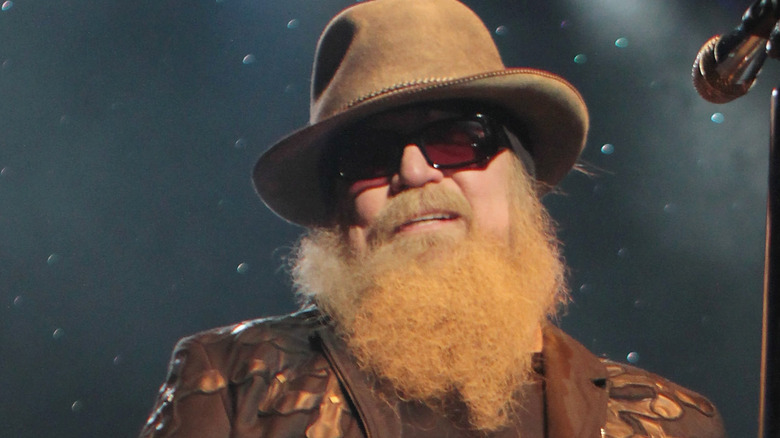The Tragedy Of ZZ Top Explained
ZZ Top's powerful sound was often imitated but never fully replicated. Nobody could make hard-charging, heavy-rocking blues with a groove the way that the Texas trio could. Icons in the 1970s with future classic rock staples like "Tush," "Cheap Sunglasses," and "La Grange," ZZ Top became some of the earliest and biggest stars of the visual '80s, before MTV stopped playing music videos. The group's fun imagery in clips for "Legs" and "Gimme All Your Lovin'" included a magical classic car named "Eliminator" (just like the blockbuster ZZ Top album), spinning electric guitars, and supremely long beards worn by bassist Dusty Hill, guitarist Billy Gibbons but not, ironically, drummer Frank Beard. ZZ Top got a lot of sound and a lot of mileage out of its small lineup and simple formula, selling millions of albums and getting inducted into the sometimes controversial Rock and Roll Hall of Fame.
But with all that happiness and achievement for ZZ Top and its members came a lot of tragedy. In the decades since the band's inception in the 1960s, its musicians have weathered death, heartbreak, illness, accidents, and both personal and professional malfeasance. Here's a look at the sadder side of the true story of ZZ Top.
The early days of the band were tough
Before he helped form ZZ Top, guitarist Billy Gibbons played in a spacy Houston band called the Moving Sidewalks. Despite some early promise — the group was among the first acts to ever open for Jimi Hendrix in the U.S. — the Moving Sidewalks era proved difficult and frustrating for its members. The Moving Sidewalks released a couple of singles regional only to Texas and recorded just one album, "Flash."
The band completed recording "Flash" in early 1968, but their label refused to release it. With the psychedelic rock movement to which the band belonged fading from popularity over the next few months, the tension and despair manifested as band turmoil. On the docket for the possibly career-making Catacombs Pop Festival in Houston in August 1968, alongside the Mothers of Invention and Canned Heat, the Moving Sidewalks didn't show up and decided to try its luck in Los Angeles. Organist Tom Moore didn't make the trip, and soon after he was drafted into the military to go fight in the Vietnam War, reducing the Moving Sidewalks to a trio, which was further depleted when bassist Summers was also conscripted into service. Finally, "Flash" arrived in stores at the end of 1969, by which point psychedelic rock was passé and the Moving Sidewalks had split up.
ZZ Top's members played in a fraud band
In 1969, British pop-rock band the Zombies scored its first American hit in five years, when "Time of the Season" reached No. 3 on the pop chart. However, the Zombies had broken up almost two years earlier, following a string of flop singles and albums. Seeking to capitalize on the band's newfound popularity, Delta Promotions staged Zombies concert tours, except that it hadn't called upon the actual members of the band. In fact, two different bands marketed as the Zombies hit the road, falsely believing that Delta owned the rights to the band's songs, and that the original Zombies was but a studio creation.
As the Zombies were a semi-obscure band from overseas, few American fans could recognize its members, so Delta could feasibly get away with hiring other musicians to pose as them. One of the faux-Zombies was based out of Texas, and included in its ranks Frank Beard and Dusty Hill, who just after this gig would go on to form ZZ Top. Both future stars used stage names, and the fans-defrauding gambit fell apart after the fake Zombies' shows earned terrible reviews from rock critics. "It was the '60s, man," Hill explained to Buzzfeed.
Early ousted member Lanier Greig died young
After the Texas psychedelic rock act Moving Sidewalks split up in the late 1960s, members Billy Gibbons and Dan Mitchell formed a new band, ZZ Top. Seeking a harder, danceable, electric blues feel, its members brought in Austin-based keyboard virtuoso Lanier Greig. While he helped give ZZ Top the sound that it wanted, and would eventually perfect it, Greig didn't stay in the group for that long. He played on the first ZZ Top 45 — "Salt Lick," backed with "Miller's Farm" — but after about a year, Greig and his bandmates parted ways over unresolved arguments about musical direction. ZZ Top brought in Dusty Hill on bass to replace Greig on keyboards. A band member that the more famous musicians in the group want fans to forget about, Greig wasn't included when ZZ Top was inducted into the Rock and Roll Hall of Fame in 2004.
After he joined the pantheon of musicians kicked out of groups just before they made it big, Lanier became an integral member of the Los Angeles session musician community, specializing in jazz and classical recordings. He'd eventually move back to Austin, where he spent his last years. On February 15, 2013, Greig died while he was asleep. The official cause of death was heart failure; the early ZZ Top member was 64 years old.
Frank Beard was addicted to drugs
After a series of commercial breakthroughs in the mid-1970s, ZZ Top was one of the fastest-rising bands in the world. In 1977, drummer Frank Beard received his first big check for $72,000, which he quickly squandered. "I spent it on drugs – every bit of it," Beard said in "ZZ Top: That Little Ol' Band From Texas" (via Ultimate Classic Rock). Before that time, Beard misused harder drugs, but wasn't able to do so to greater excess until he could afford it. His first intoxicant of choice was LSD, and then he added in other substances to suit various purposes. "The pills thing came about just from the workload. And the heroin thing came about because I just liked it. I mean, you ever done heroin? ... It's a f***ing vacation for the mind, and I liked it."
Finding himself addicted to heroin, and then later, cocaine, Beard sought out sobriety via a 30-day rehabilitation program and also enrolled in a 12-step program. To give him time to recover and get healthy, the other members of ZZ Top embarked on a multi-year break, reconvening in 1979.
Dusty Hill scared himself out of drug misuse
ZZ Top bassist Dusty Hill misused marijuana, but only during tour stops in Amsterdam, and not after one evening when he smoked so much of the drug it led to a chilling moment of panic and despair. On the night in question, Hill was smoking marijuana in his third-floor hotel room with ZZ Top's tour manager Pablo Gamboa, as well as Elwood Francis, his bass tech. Francis noticed that their window was outfitted with a secure metal bar that dropped below the opening. "After I passed the joint to Dusty on the next round, I got up and jumped out the window," Francis recalled on his Instagram page. "They can't see that I had grabbed the rail with my hand as I was passing over it and was just hanging there like I would on monkey bars."
Gamboa and Hill had been darkly pranked and, in that moment, truly believed that Francis had plunged to his death. "They ran over to the window expecting to see me splattered on the sidewalk but found me hanging there laughing. They both just remained confused about what happened while I popped back inside." That marked the last time Hill ever smoked marijuana.
Dusty Hill accidentally shot himself
In 1984, ZZ Top bassist Dusty Hill experienced a painful injury that could have killed him, sustained in the course of a mundane task. Hill used to keep a small, derringer-style handgun on his person, stowed inside of one of his boots. On December 16, 1984, his girlfriend at the time was helping him remove the boot when the gun fell out, hit the ground, and self-fired, sending a bullet upward and into Hill's abdomen. "My first reaction was: 'S***!' And then 'Ouch.' I couldn't believe I'd done something so stupid. To this day, I don't know how I could do it," Hill told Classic Rock years later. "But I didn't really feel anything at the time. All I knew was that I had to get myself to a hospital straight away, so I got in the car and drove there."
After Hill transported himself to Memorial City Hospital in Houston, doctors stabilized the musician and attended to the wound before the bullet could affect any organs. "It was only when I arrived at the hospital that the seriousness of what I'd done hit me, and I went into shock," Hill said. Fortunately, Hill made a full recovery.
Dusty Hill got sick and injured on tour a lot
ZZ Top relentlessly toured for most of its history, only taking significant breaks for emergency situations — which almost always involved bassist Dusty Hill. In May 2000, the band pulled out of a European tour after Hill received a Hepatitis C diagnosis. Contracted through a virus, the disease can cause inflammation of the liver and permanent organ damage. Hill eventually recovered, but years later, in the summer of 2007, another ZZ Top European tour was preemptively canceled when Hill once again became too sick to perform. On that occasion, doctors discovered a noncancerous growth in his inner ear, requiring Hill to receive immediate, nonsurgical treatment before it led to significant hearing loss. Then, while touring in 2014, Hill experienced a fall on the band's tour bus, sustaining an injury to his hip. The injury was so serious and needed such extensive treatment (including a replacement joint) that ZZ Top had to call off the remainder of its tour with Jeff Beck.
Less than two years later, Hill fell once more, this time in the backstage area of the Lone Star Events Center Amphitheater in Lubbock, Texas, before a concert. That show was rescheduled, which consequently put a pause on ZZ Top's tour. And in 2017, ZZ Top announced an indefinite break from live shows over what band representatives told the media (via the Houston Chronicle) was a "tummy ailment" affecting Hill.
Frank Beard almost died on tour
In 2002, ZZ Top scheduled a bunch of tour dates for Europe, those being make-up shows for many that were canceled two years previously, when bassist Dusty Hill contracted hepatitis C. The already rescheduled show planned for Paris went on as planned, but with drum tech John Douglas sitting in for regular drummer Frank Beard. For the first time in 33 years, a lineup other than the band's steadfast one took the stage, and all because of a serious medical issue.
Just after ZZ Top reached Paris, Beard experienced pain so severe that he was immediately hospitalized. Doctors diagnosed Beard with acute appendicitis and decided that the best course of action was an appendectomy — an emergency appendix removal. "I'll be back in there as soon as the doctors give me the OK," Beard said after the successful surgery in a statement (via Billboard) delivered from his hospital bed. He would eventually fully recover and rejoin ZZ Top on the road.
Dusty Hill died suddenly
Getting up on stage night after night, year after year, can be physically grueling and exhausting, and musicians can permanently damage their bodies performing live. In addition to other musically unrelated injuries and medical issues, decades' worth of performances playing bass and keyboards for ZZ Top left Dusty Hill in such a tremendous amount of pain — specifically in his hip — that he had to leave his band's 50th-anniversary tour for medical treatment. In July 2021, Hill headed home to Texas, and, by personal request, his friend and ZZ Top instrument tech Elwood Francis filled in for him, making for one of rock history's more successful band member replacements.
According to his wife, Charleen McCrory, Hill had a rehabilitation plan in place. "The plan was for another round of physical therapy, with a different approach, to help his chronic bursitis," she wrote on ZZ Top's Facebook page (via Blabbermouth). "The plan was he would return to the second leg of the tour in September." Just a week after Hill left his group because of hip problems, he died. "We are saddened by the news today that our Compadre, Dusty Hill, has passed away in his sleep at home in Houston, Texas," ZZ Top's Billy Gibbons and Frank Beard said in a statement on July 28, 2021 (via Rolling Stone). "You will be missed greatly, amigo." A specific cause of death wasn't revealed; Hill was 72 years old.
If you or anyone you know needs help with addiction issues, help is available. Visit the Substance Abuse and Mental Health Services Administration website or contact SAMHSA's National Helpline at 1-800-662-HELP (4357).
